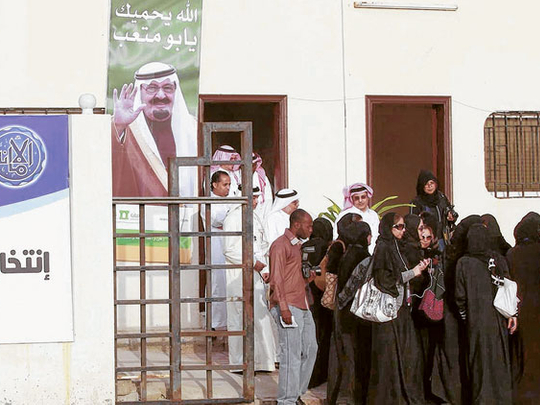
Riyadh: A ban on their participation, in the municipal elections in Riyadh and other cities, has evoked strong reactions from Saudi Arabia's women and women's rights activists.
Ignoring the ban, groups of women were seen standing at the gates of registration centres in the capital city — on the third day of the registration process — even as the general turnout at the centres remained low.
With some local newspapers publishing photos of these women, a strong public opinion has been generated supporting women's participation in the election process.
A group of women activists sent a memo to the authorities describing the ban on their participation as "arbitrary".
No limitations
About 60 Saudi women academicians and researchers have launched a Facebook campaign under the name ‘Baladi' or ‘My Country'.
The group said there were no laws limiting participation to men.
Fawzia Al Hani, chairperson of the group, told reporters that women who had approached registration centres in Riyadh, Jeddah and Dammam in the past three days — to press for their right to take part in the elections — were not violating any law.
"The law reads: ‘Woman has the right to cast her vote and stand as a candidate'," she added.
Elfat Qabbani, vice-chairperson of the industrial committee at Jeddah's Chamber of Commerce, said depriving women of their right to vote comes as a shock for many Saudi women who were concerned with the public and community service.
"I couldn't understand the fears expressed by some people regarding the participation of women in these elections.
"Previously, women in Bahrain and Kuwait have taken part in similar elections and the experiments have succeeded. Women have played effective roles in municipal councils in these countries," she added.
Saudi women have taken part in two successive elections to the chambers of commerce in Jeddah and the Eastern province, Qabbani added.
She rejected the proposal that women should approach the Human Rights Society to complain or establish a virtual municipal council on the internet.
"Women are part of the fabric of this society and represent more than half the population.
"And when seeking to get their rights they will get them through negotiations.
"So we will approach officials for more discussion," Qabbani clarified.











